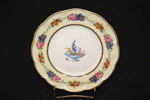|
The porcelain industry began in France in
1767, soon after the discovery of the true kaolin clay in Limoges, France. It was there that David Haviland, an American,
relocated in 1842 to start his own company and the great Haviland tradition we know today.
In the beginning, David
Haviland designed his creations with the American market in mind. Fortunately, he met painter and sculptor Felix Bracquemond
and appointed him to head his studio. During this period, the studio employed the great talent from such artists as Gauguin,
Ribiere, Dufy, and Cocteau, drastically changing the direction of Haviland designs and firmly establishing Haviland pieces
as works of art, more than mere dinnerware.
Because the china was hand-painted,
often with custom-designs, and because fine Haviland pieces have been produced for over 150 years, there are literally thousands
of patterns. In 1950, an American, Arlene Schleiger, published the first volume of "200 Patterns of Haviland China". She devised
a method of numbering patterns. Her son, Richard R., made drawings of each blank and pattern. This work enabled matchers to
catalogue the patterns and organize their inventory. By the time of her death in 1983, Mrs. Schleiger had published five volumes
cataloguing 1,000 patterns.

Theodore Haviland, son of Haviland China founder David Haviland, got
his start in the family business in the 1850s. At the end of the Civil War in 1865, Theodore was sent to America to handle
the distribution and promote Haviland porcelain while his brother Charles remained in France to oversee production.
After
David Haviland died in 1879, the brothers continued to work together for many years. However, the two visionaries, both with
strong artistic talents, found it impossible to continue to work together. Consequently, Haviland and Company closed December
31, 1891 and a new company called Haviland and Company was opened but now managed by Charles Haviland with his eldest son,
George. Theodore opened his own factory, the most modern in Limoges, France, for the company registered under his name on
August 3, 1893.
Theodore, like his father and Charles, was equally committed to
artistic innovations. His elaborate decoration programs and tableware shapes and forms were very detailed. His oldest son,
William, joined the company in 1903 and took over the company in 1919 after the death of his father, assisted by two brothers-in-law
and a brother. Under William's direction, the company produced many fine Art Deco pieces and marketed to the art-sophisticates
in Paris as well as to Americans, which helped him survive the Depression and World War II.
During
World War II, William Haviland and his brothers-in-law purchased all designs, trademarks, and rights of the former Haviland
and Company of Charles Haviland which had been liquidated in 1931. William retired in 1957, succeeded by his son, Harold.
In 1961, William's son, Theodore became President and his son Frederick became the manager of the New York office. Both retired
in 1972. In 1987, the company was acquired by a financial and industrial company, FIDEL. One of the FIDEL shareholders, Mr.
Dominique de Coster, bought the Haviland Company in 1988 and has strengthened the once family-owned and family-managed company,
continuing the traditions that made the Haviland name synonymous with quality.

In a typically French fashion, many of David Haviland's
offspring initiated their own porcelain companies to compete with one another. Not surprisingly, the one hundred and fifty
years that followed witnessed many divisions and mergers within the Haviland clan.
Robert's
son, Charles Field Haviland born in 1832 began to work with his father's brother David Haviland. He started producing fine
china in a factory which he bought in 1868 using his own trade mark: Charles Field Haviland. Charles retired in 1882.
The
tradition and the taste for China were strong in the family and his grand son Robert Haviland at the age of 27 established
his own new factory in 1924 which is the same factory where the products are manufactured today.
In
1941 Robert Haviland in honor of his grandfather Charles Field Haviland decided to use his name as the firm's trade mark.
From
the many, one is Robert Haviland and C. Parlon Limoges Porcelain. Founded in 1924, the company has come to symbolize the finest
traditions of Limoges and the Haviland family legacy.

The Johann Haviland Company, founded
in 1907 in Waldershof, Germany by John Haviland, produced everyday china, hotel china, and also high-quality china for home
use. The company was sold in 1924 to Richard-Ginori and the name changed to Porzellanfabrik Waldershof AG. In 1937,
Rosenthal China of Germany purchased the company and began producing fine china for export to the United States, marked Johann
Haviland, Bavaria, Germany.
The
Johann Haviland Corporation of Des Plaines, Illinois distributed many Johann Haviland patterns in the 70's and 80's in grocery
stores where they were offered as premiums. Some of these patterns carry a Bavarian or Thailand back stamp. Johann Haviland
China was made at the Waldershof, Germany factory until the late 1980s.

With its 150 year-old legacy as a foundation, Haviland
continues its work today in a state-of-the-art factory built in 1988 where the purest white blanks (biscuits) are produced.
All of the finishing and decorative work (borders, gold painted finishes, etc.) is done by hand by professional crafts people.
This attention to detail continues the tradition that a Haviland plate is truly a work of art.
After
drying, the finishing is done by hand which allows pieces to be rendered perfectly smooth. |
|
|
|
|

|

